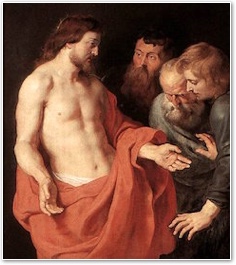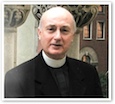Not Doubting so Much as Questioning
- FATHER GEORGE W. RUTLER
Faith in the Risen Lord consists in reaction to an event, and that is why the New Testament has a book called the Acts of the Apostles and not the Thoughts of the Apostles.
 Some of the greatest minds ever since have thought about the Resurrection, which is why we have theology, but all that thinking has been in response to what happened. Had the Resurrection been a theory rather than a fact, no one would have been surprised by it or skeptical about the first reports of it.
Some of the greatest minds ever since have thought about the Resurrection, which is why we have theology, but all that thinking has been in response to what happened. Had the Resurrection been a theory rather than a fact, no one would have been surprised by it or skeptical about the first reports of it.
Skepticism has come to mean doubt about good intentions or goodness itself, but in its classical form it meant living a simple life close to nature and not trusting authoritative statements about truth. Several centuries before the Resurrection, a Greek named Pyrrho accompanied Alexander the Great to India where he came under the influence of philosophers who were so skeptical about reliance on material things that they did not even bother to live in houses or wear clothes.
It would be easy to classify the apostle Thomas as a skeptic, if not in the classical sense, perhaps in the modern sense of not trusting people. But "Doubting Thomas" was not doubting so much as he was questioning. Surely our Lord arranged for him to question the truth of what the witnesses claimed to have seen, so that proof might be given. As faith is trust in a reliable source, Thomas was willing to put his faith in what the witnesses had described, but because he believed in objective truth, he wanted sensory evidence of what he had been told.
Here at work is what Saint Anselm called fides quaerens intellectum — faith seeking understanding. Our Lord obliged Thomas by showing his wounds. Had the Resurrection been an illusion, the witnesses would have had no difficulty understanding it, because it would have been their own invention. Blessed John Henry Newman wrote: "Many persons are very sensitive of the difficulties of Religion; I am as sensitive of them as anyone; but I have never been able to see a connexion between apprehending those difficulties, however keenly, and multiplying them to any extent, and on the other hand doubting the doctrines to which they are attached. Ten thousand difficulties do not make one doubt . . ."
Our Blessed Mother had difficulty understanding how she could have a baby in her womb without the normal biological process, and actually asked an angel how it could happen, but we do not call her Doubting Mary. Certainly her humility was purer than that of Thomas, but one expects that after her Son ascended in glory and sent the Holy Spirit, she and Thomas had many congenial conversations. As for Thomas, he went to India where centuries before Pyrrho had encountered the gymnosophoi skeptics, and he gave his life testifying to what he had seen and touched.
 This is Meaghen Gonzalez, Editor of CERC. I hope you appreciated this piece. We curate these articles especially for believers like you.
This is Meaghen Gonzalez, Editor of CERC. I hope you appreciated this piece. We curate these articles especially for believers like you.
Please show your appreciation by making a $3 donation. CERC is entirely reader supported.

Acknowledgement
 Father George W. Rutler. "Thomas: Not Doubting so Much as Questioning." From the Pastor (April 10, 2016).
Father George W. Rutler. "Thomas: Not Doubting so Much as Questioning." From the Pastor (April 10, 2016).
Reprinted with permission of Father George W. Rutler.
The Author
 Father George W. Rutler is the pastor of St. Michael's church in New York City. He has written many books, including: The Wit and Wisdom of Father George Rutler, The Stories of Hymns, Hints of Heaven: The Parables of Christ and What They Mean for You, Principalities and Powers: Spiritual Combat 1942-1943, Cloud of Witnesses — Dead People I Knew When They Were Alive, Coincidentally: Unserious Reflections on Trivial Connections, A Crisis of Saints: Essays on People and Principles, Brightest and Best, and Adam Danced: The Cross and the Seven Deadly Sins.
Father George W. Rutler is the pastor of St. Michael's church in New York City. He has written many books, including: The Wit and Wisdom of Father George Rutler, The Stories of Hymns, Hints of Heaven: The Parables of Christ and What They Mean for You, Principalities and Powers: Spiritual Combat 1942-1943, Cloud of Witnesses — Dead People I Knew When They Were Alive, Coincidentally: Unserious Reflections on Trivial Connections, A Crisis of Saints: Essays on People and Principles, Brightest and Best, and Adam Danced: The Cross and the Seven Deadly Sins.


